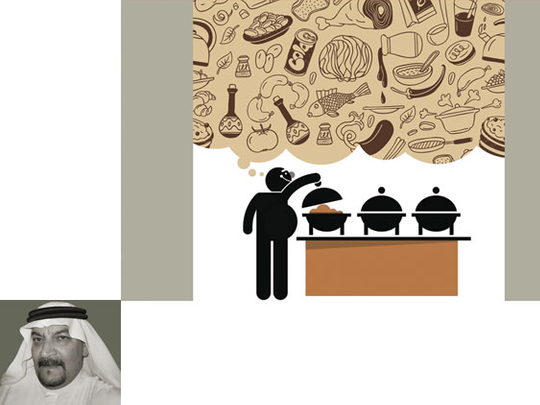
Non-Muslim expatriates living and working in the Gulf can be excused for assuming that Ramadan is a month-long saga of gastronomical excesses and lounging about as couch potatoes. They will not have failed to notice the countless food advertisements designed to tempt even the most health-conscious and prudent individual to throw caution to the wind and dive in to sample their dishes.
Along with the food and beverage industry, television owners jockey with each other to grab most viewer attention during the month. A reported 70 or more shows comprising the comedy or drama genre were produced specifically for telecast this month. In print or on billboards, each satellite channel tries to seduce potential viewers with their fare.
But coming back to the food and beverage industry, I could not help seeing how resourceful some adverts are becoming. They are everywhere; on leaflets, your e-mail and a variety of other sources. I have selected a few to share with my readers.
One goes like this: ‘Break your holy fast and enjoy more of your iftar with this feast. Indulge with a sumptuous meal and get ready to get full with today’s deal’.
Another says, ‘Iftar should never be just a routine. If you are going to eat with your loved ones, then a meal has to be a feast. Indulge with Italian and Lebanese cuisines and get ready to pig out with today’s deal.’
Then there is one that states: ‘Make your Ramadan fasting a truly spiritual experience. Break it with a scrumptious iftar buffet featuring all your traditional and international favourites!’
Yet another claims that ‘to truly feel the spirit of Ramadan, join us for an iftar buffet and enjoy a mouth-watering iftar value meal, including soup, appetisers, fattoush, a main course, soft drink, water and Arabic sweets’.
The list is endless. ‘Make the most of your Ramadan experience. Break your fast in lavish style in traditional surroundings, and top it off with Arabic sweets and coffee. A hookah area is also provided.’
‘If you haven’t broken your fast at [the name of the eatery], then you have truly missed out on the Ramadan experience. Join us for an endless array of multinational cuisine guaranteed to satisfy your cravings.’
And finally, ‘Ramadan is not complete without a mouth watering feast that includes an assortment of Arabic, Asian and European foods guaranteed to tempt your taste buds. Join us.’
If I didn’t know better, I would be among the non-Muslim expatriates who assume that this is a month where all bets are off when it comes to satisfying our gormandising urges. Some of the advertising subtly implies that one has not really fasted if one fails to patronise the establishment in question when ending the fast. Others go as far as to suggest that one’s faith is not up to the standard if one does not sample specific iftar buffets.
The gradual integration of the marketing of food and TV fare into our faith and the spiritual meaning behind Ramadan is alarming.
Layla, a recent Finnish convert to Islam, who operates a blog called the BlueAbaya and lives in Riyadh, had this to say: “I learned from my Muslim colleagues that Ramadan is also about remembering our Creator, reading the Quran, which was sent down during the month of Ramadan, doing good deeds out of a sincere wish to do them, being kind to others, giving out dawah [teaching, not preaching to non-Muslims about Islam] and remembering the poor and the less fortunate. Ramadan is about being humble, modest and abstaining not only from food, but from extravagances, over-consumption, and wasting food, money and resources.
“Sadly, what I see today is very disturbing in that many people in Saudi Arabia are doing the exact opposite. The true purpose has been long lost and forgotten. I see people stocking up on food and spending on groceries like crazy, and cooking and baking like there is no tomorrow. Women are spending their days in the kitchen instead of focusing on their religion; some out of their own will, others out of habit and routine and some because of the demands of husbands and even peer pressure.
“When it’s time for iftar, people indulge in extravagant meals and then lie around all evening snacking on deep fried, highly sweetened and unhealthy food, watching Arabic soap operas on TV, gossiping with friends and staying up all night.
“Many go to malls, which are now open till the early morning hours, and shop mindlessly. Some even force their kids to stay up late or wake them in the middle of the night so that the parents don’t have to get up early with them! The next day they sleep until evening when it all starts over again at sunset.
“Prophet Mohammad [PBUH] taught Muslims, by example, to end the fast with dates and water, eat a light meal later, say the Taraweeh prayer, go to bed as one normally would, get up early for night prayers and suhour and go about the day working and doing things that one would normally do.
“Let’s not forget the true meaning of Ramadan, its purpose, and all the blessings of this month. Break those unhealthy and binding routines and habits.”
Well said, Layla. Your words tell me that you have understood the essence of Ramadan better than some of us, who were born Muslims.
Tariq A. Al Maeena is a Saudi socio-political commentator. He lives in Jeddah, Saudi Arabia. Follow him on Twitter at www.twitter.com/@talmaeena











